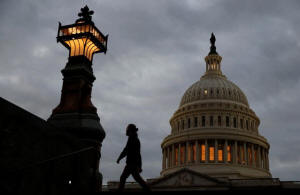|
Congress faces tricky path to avoid
government shutdown
 Send a link to a friend
Send a link to a friend
 [December 20, 2017]
By Richard Cowan [December 20, 2017]
By Richard Cowan
WASHINGTON (Reuters) - The U.S. Congress is
struggling through another contentious week as infighting over defense
spending, healthcare and other matters complicates the drive to pass a
temporary spending bill by midnight on Friday to avert a partial
government shutdown.
In a week when President Donald Trump and his fellow Republicans in
Congress are hoping to celebrate the passage of tax overhaul
legislation, many in the party showed little appetite for a government
shutdown at week's end.
But they sounded resigned to having to navigate through some drama over
a package that includes so many disparate components, which could make
for a messy process.
"I'm going to vote for whatever I need to, to keep the government open,"
Republican Representative Chris Collins told reporters.

The last time government agencies had to shut down because Washington
could not pay its bills was in October 2013.
Leading Republicans in the Senate and House of Representatives expressed
optimism that a funding bill, coupled with a large new disaster aid
package, would pass by Friday's deadline.
But some were predicting that lawmakers would bump right up against the
cutoff.
The House could vote as soon as Wednesday on legislation that extends
most funding for domestic programs through Jan. 19. Democrats are likely
to mainly oppose the bill, arguing that their priorities are being
ignored.
Conservative Republicans are insisting on higher military funding
through the rest of the fiscal year ending on Sept. 30 as part of the
House bill.
Democrats in the Senate are expected to block that formula if, as
expected, it does not also have more money for non-defense programs.
The House measure would also include $81 billion in disaster funding to
help Puerto Rico, the U.S. Virgin Islands and several U.S. states
recover from hurricanes, wildfires and other natural disasters. That
price tag has made some Republicans uneasy.
[to top of second column]
|

The U.S. Capitol building is lit at dusk ahead of planned votes on
tax reform in Washington, U.S., December 18, 2017. REUTERS/Joshua
Roberts

Some Republicans are also worried about a Senate strategy to add a
bipartisan healthcare proposal to the government funding bill, in
keeping with a promise Senate Majority Leader Mitch McConnell made
in order to coax Republican Senator Susan Collins to vote for the
tax legislation.
Conservative House Republicans do not like the bipartisan healthcare
proposal because it would fund subsidies for low-income participants
in the Obamacare health insurance program, and does not include
language that restricts federal funds for abortion.
McConnell's promise to Collins "means squat over here," said
Representative Mark Walker, chairman of the Republican Study
Committee, the largest group of conservatives in the House. Some
conservatives may vote against the funding bill in protest, he told
reporters outside the House.
The House bill also would extend the Children's Health Insurance
Program for five years.
If Democrats continue to withhold their support for the stopgap
spending bill and some Republicans peel off, Congress could find
itself struggling to pass a bill as the clock ticks toward midnight
on Friday.
(Reporting by Richard Cowan and Susan Cornwell; Editing by Jonathan
Oatis and Peter Cooney)
[© 2017 Thomson Reuters. All rights
reserved.]
Copyright 2017 Reuters. All rights reserved. This material may not be published,
broadcast, rewritten or redistributed.
 |